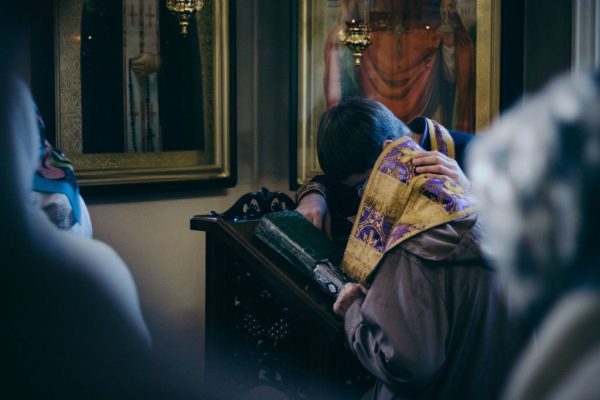Last week, I wrote at length about the true meaning of the fast. This week, I want to discuss what is probably the scariest part of Lent: confession!
The first question a lot of people ask about confession is: is it biblical?
Yes, of course it is.
Confession, like all of our services, has a long history. It wasn’t until the tenth century that the form we have today–as a private confession with a priest–took hold. Before then, confession was a public affair. Can you imagine making a confession before the entire congregation!
Nonetheless, even though confession has been practiced in different ways, the idea that we ought to confess our sins and practice repentance is very biblical. Here are a few short passages.
“From that time Jesus began to proclaim, ‘Repent, for the kingdom of heaven has come near.’” (Matthew 4:17)
“Truly I tell you, whatever you bind on earth will be bound in heaven, and whatever you loose on earth will be loosed in heaven.” (Matthew 18:18)
“If you forgive the sins of any, they are forgiven them; if you retain the sins of any, they are retained.” (John 20:23)
“Therefore confess your sins to one another, and pray for one another, so that you may be healed.” (James 5:16)
And, of course, there’s Psalm 51 (50 in the LXX), which we pray every morning in our morning prayers and every evening in Compline. That Psalm is probably confession par excellence!
So, yes, confession is scriptural and a part of our spiritual lives.
Another question I often get is: is confession just about the bad things I did?
One of the most unfortunate things about confession is that we’ve warped the meaning of confession. Today, most people understand confession in a very legalistic way. Let me explain.
We believe that we’ve done something wrong and, as a result, God has written that wrong-doing in a book … a sort of naughty list.
But, if we go to confession, then God crosses out our wrong-doing or rips out the page of our bad deeds. With this, we are “good to go again.”
This is a very legalistic understanding of confession. The worst part of this understanding is that it makes God out to be a fearful judge–and that’s not who he is. And, most of all: IT’S NOT ORTHODOX!
So, what is confession all about?
If a legalistic understanding of confession is incorrect, how ought we to think about it? Well, we should think about it as growing closer to God.
Think about a relationship you have with either a close friend or your spouse. How did you begin that relationship? Probably with small talk. Then, as you grew closer, you opened up to each other.
In other words, you had honest conversations about who you really were, where you fell short, your hopes and dreams, and other intimate things.
It’s this honest communication that built the relationships you have with your friends, family members, and spouse. It’s the same with God.
The idea is that we open up and we’re honest with God about who we are. It’s in this open honesty that we draw closer to God and grow closer to him. Theologically, we call this theosis, which is the idea that we share in God’s life. This is what we, as Orthodox, call salvation.
And–this is really important–it’s not about God simply forgetting what we did (that’s the legalistic understanding of God crossing off our wrong-doings).
Instead, it’s about hearing God saying back to us: “I love you in spite of your faults” and “I’m always there for you no matter what you do, no matter what happens to you.” This is absolution.
But, why a priest? Can’t I confess in my daily prayers or in my bedroom?
We do confession in our daily prayers when we’re alone. And, we confess when we read the pre-communion prayers. But, there’s something different about confessing before a priest.
When we make the appointment, drive to the church, and stand with the priest in front of the icon of Christ, many of us have dread, fear, and anxiety. Those feelings are real and they make confession real.
But, most importantly, when we kneel and the priest reads the prayers of absolution, those feelings also make the forgiveness real.
We truly experience forgiveness in that moment. It’s a healing moment. It’s a moment where our relationship is strengthened with God and we draw closer to him; it’s real growth and a real encounter with Christ.
What else does the priest do?
The priest is not a magician who dispenses grace as if the Church was the McDonald’s of drive-up sacraments. Instead the priest is there to assure us of God’s love–despite any shortcomings. The priest is there to help us make progress in our spiritual life.
In short, the Priest is an icon of Christ, extending Christ’s mercy.
He’s not a judge and he’s not there to make us feel bad. Rather the opposite: he’s there to make us feel loved.
How often should I confess?
I recommend that everyone try to schedule a confession during the fasting periods of the church: during Lent, the summer (either the Ss. Peter and Paul fast or the Dormition fast), and Advent.
The important thing is that we make confession a regular part of our spiritual life, because it’s an important part of our walk with God.
Don’t miss out on this critical part of your growth as a Christian.
Blessed strength to you all!

















